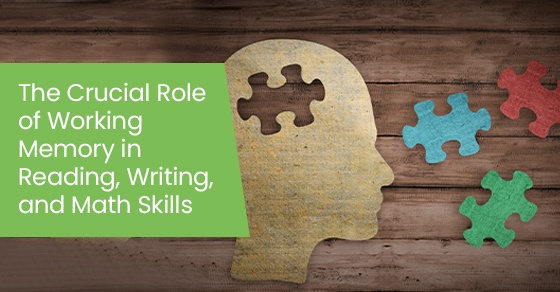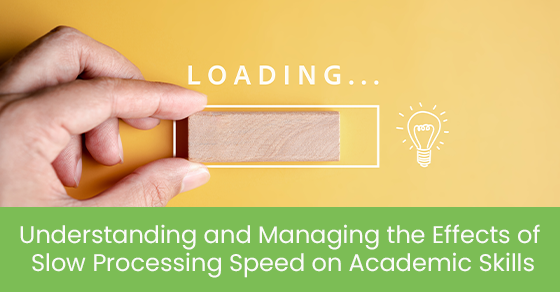|
Getting your Trinity Audio player ready...
|
Working memory, a fundamental cognitive function, plays a pivotal role in academic achievement. It acts as the brain’s temporary storage system, enabling us to hold and manipulate information for short periods. Proficient working memory is essential for complex brain tasks such as reading, writing, and solving math problems. Working memory deficits can arise from a variety of factors, including learning differences (such as ADHD), mental health disorders (such as anxiety or depression), genetic conditions, substance abuse, medications, age-related changes, and sleep deprivation. Strategies and interventions can help mitigate the challenges posed by working memory deficits.
What Is Working Memory?
It helps to think of working memory as a collection of mental Post-it™ notes. You stick important pieces of information on these notes as you go about your daily tasks. They help you remember details briefly, but they’re not meant for long-term storage. This cognitive system enables individuals to make decisions, solve problems, and understand information in real time.
Effect on Reading
Reading comprehension relies heavily on working memory. People with strong working memory can efficiently process and retain information from text, making connections between ideas and drawing conclusions. Conversely, those with working memory deficits may struggle to retain information, leading to difficulties in understanding complex texts, making inferences, and summarizing content.
Strategies for reading more effectively for people with working memory deficits include:
-Chunking Information: Breaking down information into smaller, manageable “bites” to reduce the cognitive load on working memory, and
-Visualization Techniques: Creating mental images while reading to retain and recall information more effectively.
Effect on Writing
Writing involves multiple processes, including planning, organizing, and revising, all of which heavily rely on working memory. Individuals with robust working memory can seamlessly juggle these tasks, whereas those with deficits may face challenges in organizing thoughts, structuring sentences, and editing their work.
Strategies for writing include:
-Graphic Organizers: Using visual aids such as graphic organizers to help organize thoughts before beginning the writing process, and
-Step-by-Step Instructions: Breaking down writing tasks into smaller steps and using clear instructions to ease the cognitive load on working memory.
Effect on Math Skills
Mathematics demands the manipulation of numbers, formulas, and spatial relationships, tasks that heavily engage working memory. Students with strong working memory excel in solving complex mathematical problems, while those with deficits may struggle with computation, problem-solving, and understanding mathematical concepts.
Strategies for math include:
-Using Manipulatives: Introducing concrete objects or visual aids to represent math concepts, reducing the cognitive load on working memory, and
-Scaffolded Instruction: Providing step-by-step guidance and gradually increasing the complexity of tasks to support students with working memory challenges.
Overall Academic Achievement
Working memory is a cross-cutting skill that influences various aspects of academic achievement. Addressing working memory deficits not only enhances performance in specific subjects but also contributes to overall cognitive development. Interventions should focus on creating a supportive learning environment, implementing targeted strategies, and providing individualized support to students with working memory challenges. Implementing targeted strategies and interventions creates an inclusive learning environment that empowers students to overcome working memory challenges and reach their full academic potential.
People with learning disabilities of different types may experience deficits in working memory, and these may have a significant effect on their ability to acquire and retain new information. Some of the ways in which working memory deficits can affect individuals with learning differences include:
Difficulty in Information Processing
Deficits in working memory can lead to difficulties in processing and considering information, which can hinder the understanding of complex concepts.
Trouble Following Instructions
Individuals with learning disabilities may struggle to remember and execute multi-step instructions, leading to difficulties in completing tasks.
Reading and Writing Difficulties
Tasks such as reading comprehension and writing require strong working memory. Individuals with deficits in working memory may struggle to hold and process information while reading, leading to difficulties understanding and remembering the content. In writing, they may have challenges organizing and expressing their thoughts coherently.
Math Challenges
Working memory is essential for mental calculations and solving math problems. Difficulties with working memory can hinder someone’s ability to hold and manipulate numbers and mathematical operations, affecting their performance in math-related tasks.
Poor Academic Performance
Learning disabilities, coupled with deficits in working memory, can contribute to overall academic challenges. Difficulties in processing and retaining information can affect performance, leading to lower grades and achievement.
Attention and Concentration Issues
Working memory is closely linked to attention and concentration. Individuals with learning disabilities and working memory deficits may struggle to sustain attention on tasks, leading to decreased academic engagement and productivity.
Executive Functioning Challenges
Working memory is a component of executive functioning, which includes skills like planning, organizing, and self-regulation. Deficits in working memory can affect overall executive functioning, impairing a person’s ability to manage tasks and activities independently.
Difficulty in Problem-Solving
Individuals with deficits in working memory may find it challenging to apply critical thinking skills and solve problems effectively.
The effects of working memory deficits can vary among individuals with learning disabilities, but interventions tailored to their specific needs can help. Educational strategies and accommodations, such as providing visual aids, breaking down tasks into smaller steps, and offering additional support, can mitigate the challenges associated with these deficits.
Reading Suggestions
Working Memory and Learning: A Practical Guide for Teachers by Susan Gathercole and Tracy Packiam Alloway
This guide provides practical insights for educators on how working memory influences learning in the classroom, including its impact on reading, writing, and math.
The Learning Brain: Memory and Brain Development in Children by Torkel Klingberg
This book provides insights into the science of memory and brain development in children. Klingberg, a cognitive neuroscientist, explores the role of working memory in learning and academic success.
Smart but Scattered: The Revolutionary ‘Executive Skills’ Approach to Helping Kids Reach Their Potential by Peg Dawson and Richard Guare
This book explores executive skills, including working memory, and offers practical strategies for parents to support their children’s cognitive development and academic success.
Working Memory and Academic Learning: Assessment and Intervention by Milton Dehn, a leading expert in the field, offers a comprehensive guide that explores the link between working memory and academic performance. The book provides assessment tools and intervention strategies for educators.
The Working Memory Advantage: Train Your Brain to Function Stronger, Smarter, Faster by Tracy Packiam Alloway and Ross G. Alloway
Geared toward a general audience, this book explains the concept of working memory and its effects on various aspects of life, including learning and academic achievement.



